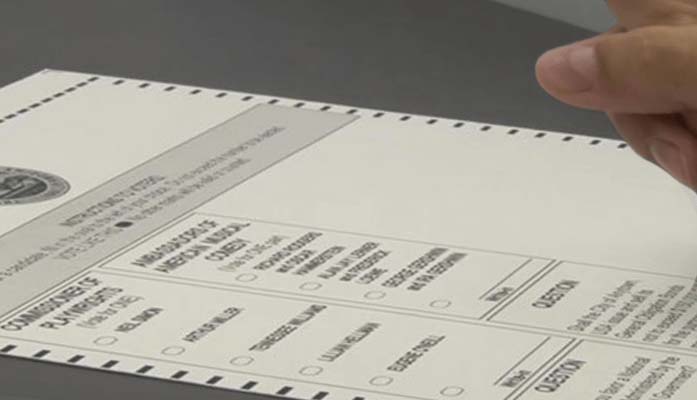
by Daniel Stefanski | Dec 28, 2023 | News
By Daniel Stefanski |
A familiar political party is coming back to Arizona ballots in 2024.
Last week, the Arizona Secretary of State’s Office announced that the Green Party “has exceeded the minimum signature requirement of 34,127 and has qualified as a new party for federal, statewide, and legislative races in the 2024 Primary and General Elections under Arizona law.”
The Party recognized its feat on “X,” writing, “The Arizona Green Party is incredibly proud to announce that we have once again achieved official political party recognition in the State of Arizona and WILL be on the ballot for the 2024 & 2026 Primary Elections.” The state’s Green Party leadership expressed gratitude to their volunteers, saying, “Thank you to the many dedicated activists, supporters, and volunteers who made this happen. Let’s turn AZ GREEN in 2024!”
Dr. Jill Stein, a candidate for the Green Party nomination, acknowledged the news from the Grand Canyon State and noted the significance of this achievement for her political faction. Stein said, “BREAKING: We’re on the ballot in Arizona! Congrats to the Arizona Green Party for this huge win – bringing Green Party ballot access to 20 states and counting! We’re well on the way to getting our urgently-needed pro-worker, anti-war, climate action campaign on the ballot across the US!”
According to the Arizona Secretary of State’s Office, the Green Party “did not file in time to appear on the March Presidential Preference Election ballot.”
Stein appeared on the 2016 November General Election ballot as the Green Party’s nominee in Arizona, where she obtained 34,345 votes. The Green Party was not afforded a spot on the ballot in 2020, when Joe Biden beat then-President Donald Trump by 10,457 votes in the state. If Arizona replicates the 2020 presidential election finish, Stein’s inclusion on the 2024 ballot could possibly be the difference between a Democrat or Republican carrying the state’s eleven electoral votes.
On its website, the Arizona Green Party asserts that it “supports livable wages, universal health care, free higher education, student debt forgiveness, full reproductive rights for women, human rights for all immigrants, LGBTQ+, with commitment to racial justice, non-violence, and environmental sustainability.”
Last month, Fontes announced that the Patriot Party of Arizona did not submit enough signatures to qualify for the ballot in Arizona elections throughout 2024.
Daniel Stefanski is a reporter for AZ Free News. You can send him news tips using this link.

by Corinne Murdock | Dec 28, 2023 | Education, News
By Corinne Murdock |
Scottsdale Unified School District (SUSD) extended its application deadline for a sex ed curriculum committee serving grades 6-9 to about mid-January.
The district disclosed that it had received enough applicants to form the Sex Ed/Human Growth and Development (HGD) committee, but that not all of the desired learning communities were represented in the applicant pool.
SUSD divides its schools into five learning communities that comprise a school feeder pattern: Arcadia Learning Community, which includes Arcadia High School, Echo Canyon K-8, Ingleside Middle School, and the Hopi and Tavan elementary schools; Chaparral Learning Community, which includes Chaparral High School, Cocopah Middle School, Copper Ridge K-8, and the Cherokee, Cochise, and Sequoya elementary schools; Coronado Learning Community, which includes Coronado High School, Tonalea Middle School, and the Hohokam, Pima, and Yavapai elementary schools; Desert Mountain Learning Community, which includes Desert Mountain High School, Desert Canyon Middle School, Mountainside Middle School, Cheyenne K-8, and the Anasazi, Desert Canyon, Laguna, and Redfield elementary schools; and Saguaro Learning Community, which includes Saguaro High School, Mohave Middle School, and the Kiva, Navajo, and Pueblo elementary schools.
The committee will be tasked with learning Arizona laws establishing processes and guidelines for HGD/sex education materials; discussing and identifying criteria for evaluating resources beyond statutory criteria; reviewing, evaluating, and discussing vendor-submitted resources; reviewing teacher and parental feedback; and recommending resources to the SUSD Governing Board for formal approval and adoption.
Arizona law requires parental permission for any sexual education lessons in grades 6-12. Sexual education is prohibited before the fifth grade.
Even prior to seeking out parental permission, school districts and charter schools must make all sex ed curricula available for review online and in person, and notify parents where these materials may be reviewed at least two weeks prior to offering the instruction.
Development of the curriculum also requires public notification, review, and input for at least 60 days before the governing board votes on the curriculum.
Committee members serve as unpaid volunteers, though eligible certified employees could receive horizontal move hours for committee meetings that occur after the school day. Members are scheduled to meet twice in January, and once in February, March, and April, though SUSD noted that there will be the possibility that more meetings could occur to accomplish their work.
The original application deadline was scheduled for earlier this month, in mid-December, with an announcement of the committee members promised for Dec. 22. The new deadline is end of day Friday, Jan. 12, 2024.
The first meeting date is scheduled less than a week after the new deadline.
At least half of the committee members will be SUSD-certified teachers who possess content knowledge of sex ed/HGD curriculum.
Those deciding on committee membership are three individuals from the SUSD Cabinet, Ed Services Department, and/or the Teaching and Learning Department.
Parent and community member applicants are asked to provide experience and/or expertise relative to sex education, such as any training, prior employment, health care background, and education levels; examples of membership on past teams that were successful; and the main reason for interest in serving on the committee.
Corinne Murdock is a reporter for AZ Free News. Follow her latest on Twitter, or email tips to corinne@azfreenews.com.

by Daniel Stefanski | Dec 27, 2023 | News
By Daniel Stefanski |
One of Arizona’s statewide Republicans is making a critical appointment to a commission.
Last week, State Treasurer Kimberly Yee announced that she had made her inaugural appointment to the Arizona Citizens Clean Elections Commission. Yee’s selection was Linda Gray, a former state senator. This selection would replace Commissioner Amy Chan.
In a statement that accompanied her press release, Yee said, “I am proud to appoint the Honorable Linda Gray to the Arizona Citizens Clean Elections Commission. Former Senator Gray knows the Clean Elections laws well and will serve with integrity to promote public confidence in the Arizona political process.”
The Republican treasurer added, “Today, I informed Governor Hobbs that with my appointments, and her two Democrat appointments, we can ensure there is a collaborative effort to support the non-partisan mission of the Clean Elections Commission. As the 2024 election cycle approaches, it is imperative that this Commission is fully and lawfully appointed.”
Earlier that day, Yee sent a letter to Hobbs, detailing her proposition to appoint three out of the five members – two Republicans and one Independent – to serve on the Commission. Yee justified her plans from A.R.S. § 16-955(D), which, as the Treasurer wrote in her communication, “requires the political parties to alternate in making these appointment selections.” Treasurer Yee asserted that since Hobbs had “made the most recent appointment in 2017 during (her) tenure as the Senate Minority Leader,” (she is) now entitled to appoint three out of the next five selections as the highest-ranking Republican elected official in Arizona.”
Treasurer Yee alerted the governor that “the highest-ranking Democrat elected official” would “have three selections in the next five-year cycle that begins in 2029.”
According to the Citizens Clean Elections Act, each member of the Commission is limited to one five-year term. Yee highlighted that this term for the current commissioners has expired, “leaving all five appointed positions de facto vacant.”
Yee also proposed that both she and Hobbs “independently appoint all of our respective selections before the February 1, 2024, deadline rather than going back and forth.”
The governor does not appear to have made any comments about the process of appointing members to the Arizona Citizens Clean Elections Commission, nor about Yee’s proposals. Yee offered to facilitate a meeting between the two if Hobbs wished “to discuss this matter further.”
Daniel Stefanski is a reporter for AZ Free News. You can send him news tips using this link.

by Daniel Stefanski | Dec 27, 2023 | News
By Daniel Stefanski |
Arizona’s top business organization is speaking out against a closure of two significant border crossings in Texas.
Last week week, the Arizona Chamber of Commerce and Industry issued a statement on “X” after the U.S. Customs and Border Protection (CBP) announced its suspension of rail operations in Eagle Pass and El Paso, Texas, due to the massive influx of illegal immigration all along the southern border. In the press release sharing the news, CBP stated that it was “taking additional actions to surge personnel and address (the) concerning development (of) a recent resurgence of smuggling organizations moving migrants through Mexico via freight trains.”
The Chamber’s “X” account said, “Rail crossing closures in Texas affect commerce border-wide, including here in AZ. We’re in a busy shipping/shopping season. We’ve already seen how Lukeville’s closure has affected cross-border commerce. The U.S. Department of Homeland Security should protect our supply chains and reverse these closures.”
In an opinion piece published in the Chamber Business News, AZ Chamber President and CEO Danny Seiden, along with the President and CEO of the Texas Association of Business, Glen Hamer, warned of the negative business and economic consequences of the increasing number of closures at the border, calling these actions “unacceptable.” The two men wrote that these closures “damage cross-border trade….cause shipping delays and cost increases, which get passed along to consumers in the form of higher prices on store shelves….make travel more difficult for folks who want to visit friends and family or simply run errands, and … cut off small businesses from their customers.”
Seiden and Hamer gave four recommendations at the end of their piece, including one for the government to prioritize “processing of legitimate trade and travel over migrants with dubious amnesty claims.”
Over the past few months, the border crisis has deteriorated considerably, forcing the Biden Administration to take rather unprecedented measures in a frenzied attempt to mitigate public perception of the massive influx of illegal immigrants into the country. One of those actions was the closure of the Lukeville Port of Entry, which is the main thoroughfare to the popular tourist destination of Rocky Point, forcing families or commerce operators to detour hours to the east or west. A local business owner recently told an Arizona outlet that, in the aftermath of the closure, Rocky Point “was like a little ghost town,” noting that “local business, restaurants, hotels, rentals, everything has declined.”
With no end in sight to the historic wave of illegal immigration, and no word on whether the Lukeville, Eagle Pass, and El Paso border operations will be reopened for business, many are wondering when and where the next major economic disruption will take place as the government searches for answers to solve this crisis.
Daniel Stefanski is a reporter for AZ Free News. You can send him news tips using this link.

by Daniel Stefanski | Dec 26, 2023 | News
By Daniel Stefanski |
The U.S. government obtained a guilty plea in its prosecution over a case of fentanyl possession across the southern border.
Earlier this month, the U.S. Attorney’s Office for the District of Arizona announced that Nathan Hernandez, a 20-year-old from Yuma, had “pleaded guilty to Possession with Intent to Distribute Fentanyl.” The Office revealed that Hernandez would be sentenced before U.S. District Judge Michael T. Liburdi, who was appointed by President Donald J. Trump, on March 25, 2024. This conviction, per the government’s information, “carries a maximum penalty of 20 years in prison and a fine of up to $1,000,000.”
According to the press release from the U.S. Attorney’s Office, “Hernandez admitted that on November 3, 2023, he entered the United States through the San Luis Port of Entry in San Luis, Arizona, with 115.04 pounds of fentanyl pills hidden in a non-factory compartment of his 2020 Dodge Ram.” The young man also confessed that “he possessed the fentanyl with the intent to deliver it to another person.”
Data from the U.S. Sentencing Commission in 2021 showed that 86.3 percent of fentanyl drug trafficking convictions were U.S. citizens, while 8.9 percent of convictions were illegal immigrants and 4.3% for legal non-citizens. The vast majority of fentanyl seizures occur at ports of entry or vehicle check points – 91 percent. However, with the overwhelming number of ‘gotaways’ and the strategic abilities of cartels and smugglers to evade detection with their loads, the amount of illicit drugs escaping detection wouldn’t likely be known to government officials.
In 2022, The Washington Post published an article about the proliferation of fentanyl from Mexico to the United States, citing estimations from unnamed federal drug agents that “they are seizing 5 to 10 percent of the drugs coming from Mexico – if that much.” The article also stated that “agents say it has been nearly impossible to stop fentanyl trafficking” at the border.
Daniel Stefanski is a reporter for AZ Free News. You can send him news tips using this link.

by Daniel Stefanski | Dec 26, 2023 | News
By Daniel Stefanski |
Arizona sheriffs are standing with the State of Israel and members of the Jewish community in the United States.
Last week, leaders from the Arizona Sheriff’s Association sent an open letter to communicate their support for members of the Jewish Institute for National Security of America.
The letter, signed by Yavapai County Sheriff David Rhodes and Navajo County Sheriff David Clouse, stated that they “stand against the recent spate of antisemitic criminal acts,” adding their commitment “to defend the places of worship Jews frequent and investigate any threats against members of the Jewish community.”
In their letter, Rhodes and Clouse wrote that they sit in daily horror due to the “senseless violence of the terrorist organization Hamas on the citizens of Israel – Jews and non-Jews alike.” They asserted that “the war in Israel and Gaza has given rise to crimes targeting Jews across the United States,” and declared that “antisemitic attacks won’t be tolerated here in Arizona.”
The sheriffs also said that “Israel’s right to defend itself isn’t up for debate.” They expressed hope that the world would “see a safer Middle East where Israel and its neighbors live in peace and prosperity” after the conclusion of the ongoing war.
As they closed their letter, the two Arizona officials encouraged “all law enforcement across the country” to “rise to the moment to support Jewish communities targeted by people looking to commit evil acts based on religious hatred.”
Antisemitism has seen an increase in the United States – even before the noticeable crescendo of actions and rhetoric after the October 7th terrorist attacks in Israel. According to a report from the Tel Aviv University’s Center for the Study of Contemporary European Jewry and the Anti-Defamation League, there was “a sharp rise in the number of antisemitic incidents in the United States and other countries” in 2022. The United States was credited with 3,697 of these incidents, compared to 2,717 in 2021 – over a thirty-five percent increase year-over-year.
However, since the October 7th massacre, the number of antisemitic incidents in the United States has grown exponentially. The Anti-Defamation League “recorded a total of 2,031 antisemitic incidents between October 7 and December 7, up from 465 incidents during the same period in 2022, representing a 337-percent increase year-over-year.”
Earlier this month, the Prescott City Council unanimously adopted a resolution that, in part, “called upon Prescott law enforcement to remain vigilant in protecting Israeli Americans, Jewish Americans and all supporters of Israel from acts of crime and unlawful discrimination that tend to manifest at such times.” This action followed an earlier resolution from the Arizona State Legislature’s Republican leaders, who “called on Arizona’s officials in the Executive branch to hold accountable any individuals who engage in any acts of terrorism supporting Hamas,” prohibited by state laws.
Daniel Stefanski is a reporter for AZ Free News. You can send him news tips using this link.






